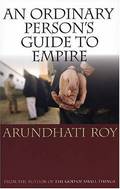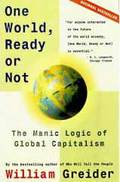Menu

More books on:
• environmental health
• food sovereignty
• ecofeminism
• peace and war
• struggling against the odds
• seeking solutions
• others
Selected titles:

- "Time to Rise," by Maylei Blackwell, Linda Burnham, Jung Hee Choi

- "We Are Everywhere," by Notes From Nowhere

- "An Ordinary Person's Guide to Empire," by Arundhati Roy
- "Water Wars," by Vandana Shiva

- "Debt Boomerang," by Susan George

- "One World, Ready or Not," by William Greider

- "Globalizing Civil Society," by David C. Korten
Globalization
How the world economy works - and doesn't.
Time to Rise
Edited by: Maylei Blackwell, Linda Burnham, Jung Hee Choi
(2001) $15.00
A collection of 14 critical essays "documenting the conditions of U.S. women of color and their strategies and movements for change. Whether resisting the global sweatshop or the prison industrial complex, fighting welfare reform and anti-Arab racism, or demanding reproductive rights and healthy environments, women of color are leading their communities in struggles for economic, social and racial justice and connecting issues of racism, sexism and homophobia.
Originally prepared for the UN World Conference Against Racism in Durban, South Africa, 2001, Time to Rise is ideal for classrooms."
We Are Everywhere: the irresistible rise of global anticapitalism
Edited by Notes From Nowhere
Verso London/New York 2003
ISBN 1-85984-447-2
"The world is made up of stories, not atoms," wrote Muriel Rukeyser. We Are Everywhere is a book of stories, stories written by activists from the front lines of resistance against capitalism and economic globalization, tales of struggle and rebellion from participants in a movement of movments that is gaining ground on every continent. These stories, told with both words and pictures, have been collected over the past three years by a collective of activists, writers and artists, all of whom have deep connections to the movement.
http://www.weareeverywhere.org/
An Ordinary Person's Guide to Empire
Arundhati Roy
South End Press, Published: 15 September, 2004,
158 pages, ISBN: 0896087271 $9.60
"The battle to reclaim democracy is going to be a difficult one. It is a battle that must range across continents and countries. It must not acknowledge national boundaries, but if it is to succeed, it has to begin in America. The only institution more powerful than the U.S. government is American civil society. Hundreds of thousands of you have survived the relentless propaganda you have been subjected to, and are actively fighting your own government. In the ultra-patriotic climate that prevails in the United States, that's as brave as any Iraqi or Afghan or Palestinian fighting for his or her homeland. I hate to disagree with your president: yours is by no means a great nation. But you could be a great people." --Arundhati Roy.
An Ordinary Person's Guide to Empire. Arundhati Roy masterfully draws the thread of empire through ostensibly disconnected arenas, highlighting the parallels between the poverty draft in the United States, caste poplitics in India, AIDS in South Africa, reconstruction contracts in Iraq, and the perverse machinery of mass media worldwide.
Essayist and novelist Arundhati Roy won the Book Prize for The God of Small Things, which spent 49 weeks on the New York Times bestseller lists and has been published in 33 languages.
Water Wars
Privatization, Pollution, and Profit
Vandana Shiva
158 pages, 2002 ISBN 0-89608-650-X paper $14.00
ISBN 0-89608-651-8 cloth $40.00
In Water Wars, Vandana Shiva uses her remarkable knowledge of science and society to analyze the historical erosion of communal water rights. Examining the international water trade, damming, mining, and aquafarming, Shiva exposes the destruction of the earth and the disenfranchisement of the world's poor as they are stripped of their rights to a precious common good.
In Water Wars, Shiva reveals how many of the most important conflicts of our time, most often camouflaged as ethnic wars or religious wars, such as the ongoing Israeli-Palestinian conflict, are in fact conflicts over scarce but vital natural resources.
Shiva celebrates the spiritual and traditional role water has played in communities throughout history, and warns that water privatization threatens cultures and livelihoods worldwide. She calls for a movement to preserve water access for all, and offers a blueprint for global resistance based on examples of successful campaigns like the one in Cochabamba, Bolivia, where citizens fought for and retained their water rights.
"Shiva contributes to the heated debate on the global water crisis.… Shiva argues forcefully that the main causes of water scarcity are not population growth and natural disasters, but greed and wasteful consumption." —Lori Pottinger, World Rivers Review
"Colorful and enlightening.… An excellent starting point for anyone who wants to understand the forces driving water scarcity today and threatening its future supply." —Kerryn Higgs, Women's Review of Books
"A chilling, in-depth examination of the rapidly emerging global crisis." —Kristie Reilly, In These Times
Debt Boomerang
How Third World Debt Harms Us All
Susan George
Pluto Press with the Transnational Institute (TNI) a 1992 classic
ISBN 0 7453 0594 6 Pb
Debtor nations in the third world are not the only victims of the debt crisis. This study shows that "we in the North must also pay the price of World Bank and IMF policies that have accelerated deforestation, encouraged mass migrations, fuelled an expanding drug trade and heightened global instability and conflict. Our taxes underwrite the irresponsible and short-sighted loan policies of the banks, and sustain the downward spiral of global indebtedness." (cover text)
"Without the cascades of easy money in the 1970s and early 1980s, much ecological damage could have been averted. Heavy borrowing in the 1970s financed huge, ecologically harmful projects such as mega-dams, nuclear power plants, smelters designed to be fuelled with forest-derived charcoal, huge industrial and agricultural estates and so on. When the bills came due, as they did especially after the debt crisis exploded in 1982, ever-greater quantities of environmental resources had to be cashed in to pay them." (p. 2)
"From country to country, the details inevitably differ. Yet at a general level, it is the same dreary story. We witness the failure of a development model still enthusiastically endorsed by the IMF and the World Bank, the main managers of the debt system. It is a slow failure. It wounds and tortures before it kills. In its current stage, the key element is the way debt drains countries of their material and spiritual resources. It is a violence; in response, for some, violence seems the only or at least the best option. Sometimes that violence is in the form of a riot, sometimes a new war, sometimes an old one." (p. 166)
One World, Ready or Not
The Manic Logic of Global Capitalism
William Greider
Simon & Schuster (Touchstone), 1998
528 pp. $ 15.00 ISBN 0 684 83554 1
Read this book for a course in how the world's economy works - and doesn't. This brilliant and readable review of the world's woes also gives ideas for progressive change.
Globalizing Civil Society
Reclaiming Our Right to Power
David C. Korten
The Open Media Pamphlet Series (Seven Stories Press NYC) 1998
78p. $5.95 ($7.95 Cdn.; ÂŁ3.99 U.K.) ISBN 1-888363-59-2 Pb
Another in this handy series of little books with big ideas, which the author has distilled from many sources (notes provided) as well as his own longer work "When Corporations Rule the World" (1995). He considers the problems in current ruling institutions, and how civil society is indentifying alternatives to them. From his analysis:
"An essential first step toward giving precedence to the imperatives of the living world is to recognize that our challenge for the third millennium is not to accelerate and sustain economic growth - which is a money-world imperative - but rather to create just, sustainable, and democratic societies that bring the human species into balance with itself and the planet - a living-world imperative."
…"It is significant that roughly 60 percent of the world's people, though they face many hardships, are more or less meeting their basic needs in reasonably sustainable ways. We may refer to them as the world's sustainer class. Unfortunately, from a living-world perspective, the goal of economic policy almost everywhere is to increase the consumption of the overconsumers and turn sustainers into overconsumers."
For more information on David Korton's work, visit The People-Centered Development Forum's web site.

